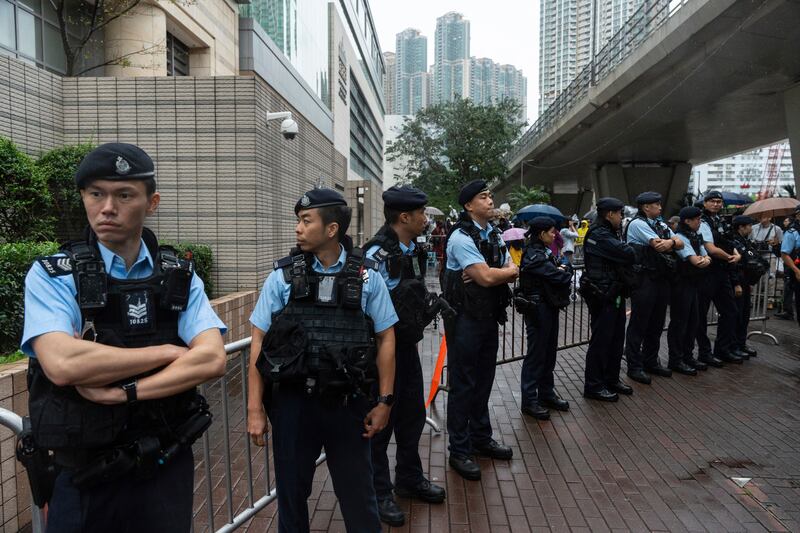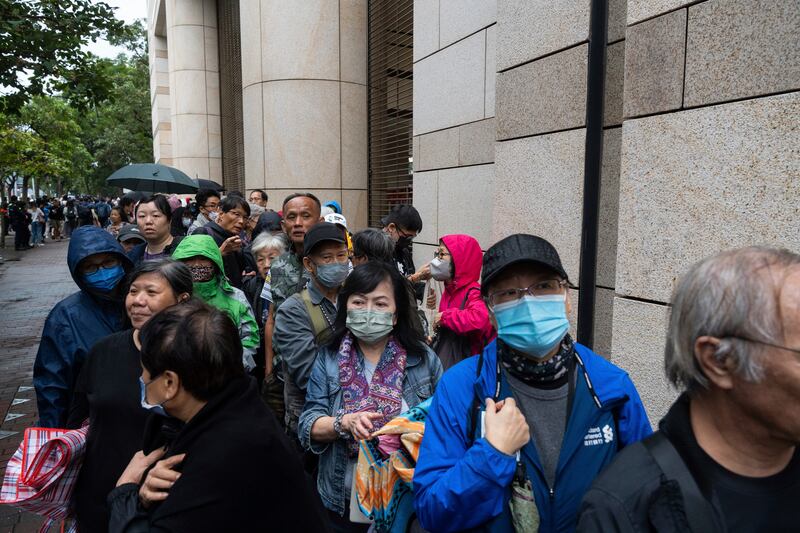A Hong Kong court jailed 45 democracy supporters for up to 10 years on Tuesday at the end of the city’s biggest national security trial that has damaged its reputation as an outpost of freedom in Greater China and drawn criticism from the United States and other Western countries.
In all, 47 Hong Kong opposition politicians and pro-democracy activists were charged with “conspiracy to commit subversion” under the city’s 2020 National Security Law for taking part in a democratic primary in the summer of 2020. Two were acquitted.
China imposed the law on the former British colony a year after it was rocked by anti-government riots.
Beijing said the law was necessary to safeguard the Asian financial hub’s economic success but critics denounced it as meaning the end of a “one country, two systems” formula under which Hong Kong returned to Chinese rule in 1997, that was meant to safeguard freedoms not enjoyed elsewhere in China for 50 years.
Prominent democracy activist Benny Tai, who was accused of being the organizer of the 2020 primary election, was jailed for 10 years, while Joshua Wong, another leading activist, was sentenced to four years and eight months in prison.
Activist Owen Chow was sentenced to seven years and nine months and former journalist-turned-activist Gwyneth Ho, was jailed for seven years.
The charge of “conspiracy to commit subversion” carries a maximum penalty of life imprisonment.
Security was tight outside the West Kowloon Magistrates Court where the sentences were handed down, with a heavy police presence on the streets.

The embassies of many countries, including the U.S., Britain, Germany and Australia, sent representatives to the hearing.
Repeated delays to the 118-day trial have meant that the majority of the defendants have been behind bars for more than three-and-a-half years, something that would have been previously unheard of in the Hong Kong judicial system.
Thirty-one of the defendants pleaded guilty and 16 denied the charges.

The 47 former pro-democracy lawmakers and opposition activists helped to organize a primary election in July 2020, in a bid to find the best candidates for a pan-democratic slate in the city’s September 2020 Legislative Council elections.
The prosecution argued that their bid to win a majority was “a conspiracy” to undermine the city government and take control of the Legislative Council.
Article 22 of China’s National Security Law for Hong Kong bans anyone from “seriously interfering in, disrupting or undermining the performance of duties and functions in accordance with the law by the body of central power of the People’s Republic of China or the body of power of the Hong Kong Special Administrative Region by force or threat of force or other unlawful means.”
More than 600,000 voters took part in the primary, which was part of a bid to win enough votes for pro-democracy candidates to veto the government’s budget, which would have offered the opposition camp valuable political leverage when negotiating with the government.
‘Devastating blow’
As Beijing-backed media claimed the primary was a bid to overthrow the city government, the administration of then-Chief Executive Carrie Lam announced an investigation into it.
Lam also postponed the September 2020 election, citing the COVID-19 pandemic, while the government rewrote the electoral rulebook to prevent pro-democracy candidates from running, eventually holding an election in December 2021 in which only “patriots” approved by a Beijing-backed committee were allowed to stand.
On Jan. 6, 2021, newly formed national security police dispatched more than 1,000 officers to 72 locations across Hong Kong, arresting 55 people on suspicion of subversion under the National Security Law in a crackdown that pro-democracy activists said struck a “devastating blow” to the city’s political life.
They brought formal charges against 47 of them, then denied bail to the majority following a grueling arraignment hearing lasting more than four days, including a first-day session of 15 hours, during which defendants were unable to eat, shower or get a change of clothes.
RELATED STORIES
Hong Kong’s “47 Activists Case”: A Record-Breaking Political Trial
EXPLAINED: Who are the Hong Kong 47?
Hong Kong rejects amnesty for thousands arrested for 2019 protests
The charges were the first clear indication that the ruling Chinese Communist Party and Hong Kong officials would be using the National Security Law to crack down on peaceful opposition and public dissent, rather than to restore public order in the wake of the 2019 protests, and sparked an international outcry.
The last British colonial governor of Hong Kong, Lord Patten of Barnes, said the trial was part of a political “purge” by the ruling Chinese Communist Party.
Washington condemned the detention and charging of democrats, with Secretary of State Antony Blinken calling for their immediate release.
Then-British foreign secretary Dominic Raab called the charges “deeply disturbing” and said it showed how the security law was being used to eliminate political dissent rather than restoring order following the 2019 protest movement, as the government had claimed.
Then-Australian foreign minister Marise Payne said the 47 defendants “were peacefully exercising their rights,” while the German foreign ministry called on the Hong Kong authorities to release the defendants and schedule postponed elections to the Legislative Council “in a fair and democratic manner.”
Edited by Taejun Kang and Mike Firn.
